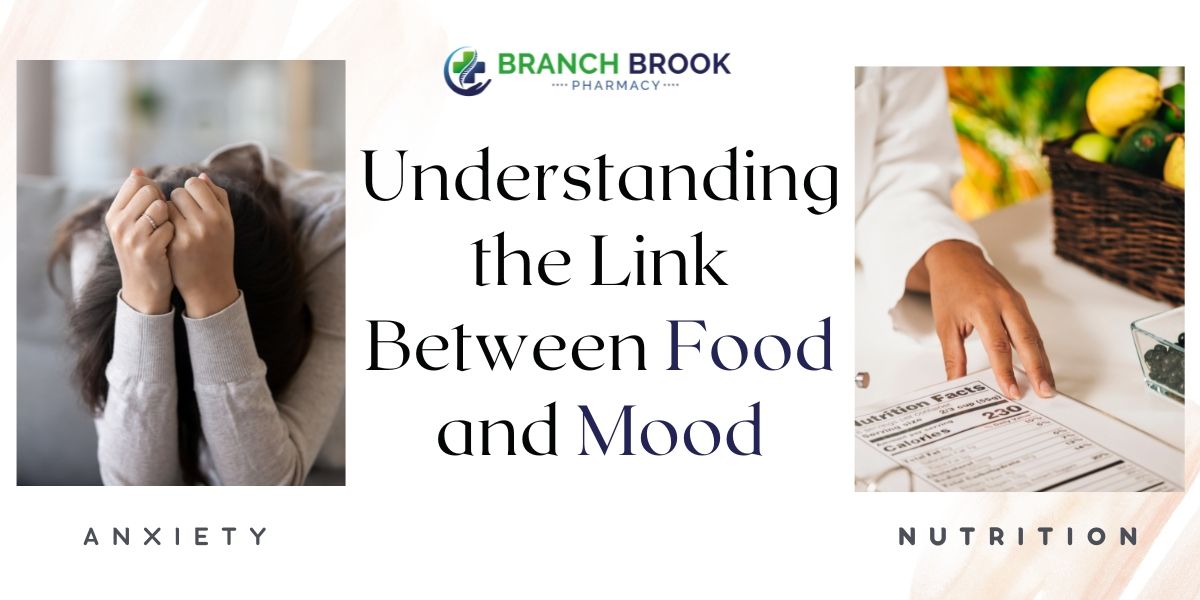Welcome to our latest blog post on anxiety and nutrition! Have you ever noticed how certain foods can affect your mood? Maybe a cup of tea or a piece of chocolate helps calm your nerves, while junk food leaves you feeling lethargic and anxious. Well, the link between what we eat and how we feel is real, and it’s time to start paying attention. In this article, we’ll explore the fascinating connection between food and mood, including which nutrients can help alleviate anxiety symptoms and prevent future episodes. So grab a healthy snack (or maybe even some dark chocolate!) as we dive into this important topic together.
What Is Anxiety?
Anxiety is a normal emotion that everyone experiences at one time or another. It’s a feeling of uneasiness, worry, or fear. For some people, however, anxiety can be overwhelming and disabling. When this happens, it can interfere with work, school, and personal relationships.
There are many different types of anxiety disorders, including Generalized Anxiety Disorder (GAD), Panic Disorder, Obsessive-Compulsive Disorder (OCD), Social Anxiety Disorder, and Post-Traumatic Stress Disorder (PTSD). Symptoms of anxiety can include:
- Feeling restless, wound-up, or on-edge
- Being easily fatigued
- Having difficulty concentrating
- Feeling irritable
- Having muscle tension
- Difficulty falling asleep or staying asleep
- Sweating
- Nausea or upset stomach
Anxiety can also lead to panic attacks, which are sudden episodes of intense fear that may include a pounding heart, sweating, shaking, shortness of breath, chest pain, dizziness, and nausea. People who have panic disorder often live in fear of having another attack and avoid places where they’ve had previous attacks. This can make going to work, school, or running errands very difficult.
Anxiety disorders are the most common mental health condition in the United States. According to the National Institute of Mental Health (NIMH), about 18% of adults in the U.S. suffer from an anxiety disorder in
The Link Between Food and Mood
The connection between food and mood is a complex one. However, there are some generalities that can be made. Food can affect mood both in the short-term and the long-term. In the short-term, the type of food consumed can impact energy levels and how alert or sleepy a person feels. For example, eating a large meal may make a person feel sluggish, while eating something with lots of sugar may make them feel more energetic. Long-term, what a person eats regularly can impact their mental health. For example, someone who consumes a diet high in processed foods and refined sugars is more likely to experience anxiety and depression than someone who eats a balanced diet with plenty of fresh fruits and vegetables.
There are several nutrients that are particularly important for mental health: omega-3 fatty acids, magnesium, probiotics, vitamin D, and iron. Omega-3 fatty acids are found in fish oil and certain plant oils (flaxseed oil, chia seeds). They are essential for brain function and have been shown to reduce symptoms of anxiety and depression. Magnesium is found in dark leafy greens, nuts, seeds, and whole grains. It helps to regulate stress hormones and has calming effects on the nervous system. Probiotics are live bacteria that are found in yogurt, sauerkraut, kimchi, and other fermented foods. They help to maintain a healthy gut microbiota which is important for overall health and has been linked to reduced anxiety and depression
Nutrients That Help Reduce Anxiety
A growing body of research is beginning to explore the link between nutrition and anxiety. While the exact relationship between the two is still being investigated, there are some nutrients that have been shown to help reduce anxiety.
Omega-3 fatty acids: Omega-3 fatty acids are a type of polyunsaturated fat that has multiple health benefits. One of these benefits is reducing anxiety. Omega-3 fatty acids work by reducing inflammation throughout the body and also affecting brain chemistry in a way that promotes calmness and relaxation. Foods rich in omega-3s include salmon, flaxseeds, chia seeds, and walnuts.
Magnesium: Magnesium is a mineral that is involved in over 300 different biochemical reactions in the body. It has been shown to help reduce anxiety by promoting relaxation and calming the nervous system. Foods rich in magnesium include dark leafy greens, nuts and seeds, fish, beans, whole grains, and avocados.
Probiotics: Probiotics are live bacteria and yeasts that are good for your gut health. They have been shown to help reduce anxiety by improving gut health and relieving stress. Probiotic-rich foods include yogurt, kimchi, sauerkraut, and miso soup.
These are just a few of the nutrients that have been shown to help reduce anxiety. If you think your diet may be contributing to your anxiety, talk to a registered dietitian or other healthcare professional to see if making any changes
Foods That Increase Anxiety
While there are many foods that can help to reduce anxiety, there are also some that can increase it. Here are some of the most common:
- Caffeine: This is a stimulant and can therefore increase anxiety levels. It is found in coffee, tea, cola and energy drinks.
- Sugar: A high sugar intake can cause blood sugar levels to fluctuate, which can lead to feelings of anxiety.
- Trans fats: These are found in processed foods and can increase inflammation in the body, which can trigger anxiety.
- Alcohol: While moderate alcohol consumption may have some anti-anxiety benefits, too much can actually intensify anxiety symptoms.
- Processed foods: These often contain additives and preservatives that can affect mood and may contribute to anxiety.
Eating Strategies to Reduce Anxiety
When it comes to anxiety, what you eat can either help or hinder your condition. There are certain eating strategies you can adopt to help reduce your anxiety levels.
First, it’s important to eat regular meals and snacks throughout the day. This will help keep your blood sugar levels stable, which can in turn help reduce feelings of anxiety. It’s also important to make sure you’re getting enough protein, as this can help improve mood and cognitive function.
Certain foods have also been shown to help reduce anxiety. omega-3 fatty acids, for example, have anti-inflammatory and antidepressant properties. Foods rich in omega-3 fatty acids include salmon, walnuts, and flaxseeds. Probiotic-rich foods such as yogurt and sauerkraut are also thought to be helpful for reducing anxiety by promoting a healthy gut microbiota.
Avoid processed foods and sugary drinks as these can trigger or worsen anxiety symptoms. Caffeine is also best avoided, as it can cause jitters and exacerbate anxious feelings.
In A Nutshell
This article has explored the powerful link between anxiety and nutrition, demonstrating how an unhealthy diet can affect a person’s mental health. To help prevent and manage anxiety, it is essential to develop healthy eating patterns that provide your body with the nutrients it needs for optimum functioning. Eating nutritious foods will not only benefit your physical health but also improve your overall wellbeing by reducing stress and improving cognitive performance. With this understanding of how food affects our moods, we at BranchBrook Pharmacy can make positive changes to our diets which will help us live happier and healthier lives!
Also Read : Understanding Silent Migraine: What You Need to Know – Branch Brook Pharmacy


